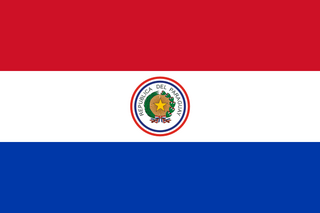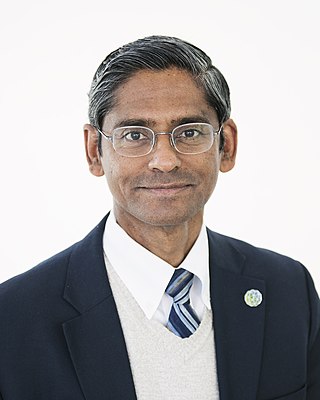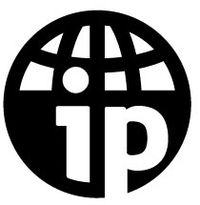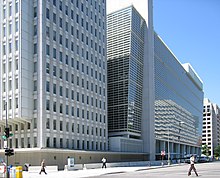The International Bank for Reconstruction and Development (IBRD) is an international financial institution, established in 1944 and headquartered in Washington, D.C., United States; it is the lending arm of World Bank Group. The IBRD offers loans to middle-income developing countries. It is the first of five member institutions that compose the World Bank Group. The initial mission of the IBRD in 1944, was to finance the reconstruction of European nations devastated by World War II. The IBRD and its concessional lending arm, the International Development Association (IDA), are collectively known as the World Bank as they share the same leadership and staff.

The World Bank Group (WBG) is a family of five international organizations that make leveraged loans to developing countries. It is the largest and best-known development bank in the world and an observer at the United Nations Development Group. The bank is headquartered in Washington, D.C., in the United States. It provided around $98.83 billion in loans and assistance to "developing" and transition countries in the 2021 fiscal year. The bank's stated mission is to achieve the twin goals of ending extreme poverty and building shared prosperity. Total lending as of 2015 for the last 10 years through Development Policy Financing was approximately $117 billion. Its five organizations are:
The International Development Association (IDA) is a development finance institution which offers concessional loans and grants to the world's poorest developing countries. The IDA is a member of the World Bank Group and is headquartered in Washington, D.C. in the United States. It was established in 1960 to complement the existing International Bank for Reconstruction and Development by lending to developing countries which suffer from the lowest gross national income, from troubled creditworthiness, or from the lowest per capita income. Together, the International Development Association and International Bank for Reconstruction and Development are collectively generally known as the World Bank, as they follow the same executive leadership and operate with the same staff.

The European Investment Bank (EIB) is the European Union's investment bank and is owned by the 27 member states. It is the largest multilateral financial institution in the world. The EIB finances and invests both through equity and debt solutions companies and projects that achieve the policy aims of the European Union through loans, equity and guarantees.

The Forest Stewardship Council GmbH (FSC) is an international non-profit, multistakeholder organization established in 1993 that promotes responsible management of the world's forests via timber certification. This organization uses a market-based approach to transnational environmental policy.
James William MacNeill, OC was a Canadian consultant, environmentalist, and international public servant.
BBB National Programs, an independent non-profit organization that oversees more than a dozen national industry self-regulation programs that provide third-party accountability and dispute resolution services to companies, including outside and in-house counsel, consumers, and others in arenas such as privacy, advertising, data collection, child-directed marketing, and more. The Center for Industry Self-Regulation (CISR) is BBB National Programs' 501(c)(3) non-profit foundation. CISR supports responsible business leaders in developing fair, future-proof best practices, and the education of the public on the conditions necessary for industry self-regulation.
The Independent Evaluation Group (IEG) is an independent unit within the World Bank Group (WBG) charged with objectively evaluating the activities of the International Bank for Reconstruction and Development (IBRD) and International Development Association, the work of International Finance Corporation (IFC) in private sector development, and the Multilateral Investment Guarantee Agency's (MIGA) guarantee projects and services to provide accountability, help de WGB avoid unnecessarily mistakes and successfully reach their goals.

The Office of Congressional Workplace Rights was created through the Congressional Accountability Act of 1995 (CAA) which applied workplace protection laws to approximately 30,000 employees of the legislative branch nationwide and established the Office of Compliance to administer and ensure the integrity of the Act through its programs of dispute resolution, education, and enforcement. The OCWR educates members of Congress, employing offices and employees, and the visiting public on their rights and responsibilities under workplace and accessibility laws. The OCWR also advises Congress on needed changes and amendments to the CAA; and the OCWR's General Counsel has independent investigatory and enforcement authority for certain violations of the CAA.
The Energy Resources Conservation Board (ERCB) was an independent, quasi-judicial agency of the Government of Alberta. It regulated the safe, responsible, and efficient development of Alberta's energy resources: oil, natural gas, oil sands, coal, and pipelines. Led by eight Board members, the ERCB's team of engineers, geologists, technicians, economists, and other professionals served Albertans from thirteen locations across the province.

Kristalina Ivanova Georgieva-Kinova is a Bulgarian economist serving as the 12th managing director of the International Monetary Fund since 2019, and the first person from an emerging market economy to lead the institution. Born in Sofia, her university education was at London School of Economics (LSE), followed by a return to her native Bulgaria where she witnessed some of the economic hardships of the post-Communist transition. She began her career by teaching economics, becoming a prominent figure in the field.

The World Bank is an international financial institution that provides loans and grants to the governments of low- and middle-income countries for the purposes of economic development. The World Bank is the collective name for the International Bank for Reconstruction and Development (IBRD) and International Development Association (IDA), two of five international organizations owned by the World Bank Group. It was established along with the International Monetary Fund at the 1944 Bretton Woods Conference. After a slow start, its first loan was to France in 1947. In its early years, it primarily focused on rebuilding Europe. Over time, it focused on providing loans to developing world countries. In the 1970s, the World Bank re-conceptualized its mission of facilitating development as being oriented around poverty reduction. For the last 30 years, it has included NGOs and environmental groups in its loan portfolio. Its loan strategy is influenced by environmental and social safeguards.

China originally joined the World Bank Group (WBG) on December 27, 1945. However, after the Chinese Civil War, the World Bank recognized the Republic of China as its member, until the relationship ended in 1980, when the membership was replaced by the People's Republic of China. The People's Republic of China (PRC) did not become involved with the World Bank group until 1980, when it first joined the World Bank in April due to the market reforms known as reform and opening-up. Prior to the economic reform and its relation with the World Bank, according to CRS, "China maintained policies that kept the economy very poor, stagnant, centrally controlled, vastly inefficient, and relatively isolated from the global economy". Since its entry into the World Bank, China has transformed into a market-based economy and has experienced rapid economic and social development. Currently, although China has become the world's second largest economy with 1.4 billion population, it still has a close relationship with the World Bank in areas such as poverty, environmental protection and new challenges from the reform.
The World Bank Group country partnership framework aims to support Haiti's efforts to reduce poverty and provide economic opportunities for all Haitians. The framework aims to strengthen institutions, government capacity, and public financial management as aid and concessional financing rapidly decline.

Vietnam joined the World Bank Group (WBG) on 21 September 1956. Before the mid-1980s, Vietnam was one of the world's least developed countries. A series of economic and political reforms launched in 1986, known as Đổi Mới, caused Vietnam to experience rapid economic growth and development, becoming a lower middle-income country. The World Bank (WB) has maintained a development partnership with Vietnam since 1993. As of 25 March 2019, it has committed a total of US$24 billion in loans, credits, and grants to Vietnam through 165 operations and projects, 44 of which are active as of 2019 and comprise US$9 billion. With an estimated extreme poverty rate below 3% and a GDP growth rate of 7.1% in 2018, Vietnam's economy continues to show fundamental strength and is supported by robust domestic demand and export-oriented manufacturing.
The Bisri Dam is a planned dam on the Bisri river in Lebanon. The dam is part of the Lebanon Water Supply Augmentation project, with water management as the primary purpose. The project is organised by the Government of Lebanon in order to tackle water scacity issues in Lebanon and specifically in the Greater Beirut and the Mount Lebanon area. The expected funding for the project was coming from the World Bank, the Islamic Development Bank, and the Government of Lebanon, and it is executed by the Lebanese Council for Development and Reconstruction. The Bisri dam project started on September 30, 2014, and is projected to end by June 30, 2024. The dam is planned to be located 35 kilometres south of Beirut in Bisri Valley, close to the village of Bisri. Due to its impact on the environment, archaeological sites, agriculture as well as seismic risk the dam project has faced opposition from civil society, political parties, adjacent municipalities and also internationally.

Mali joined the World Bank Group in 1963 after they gained their independence from France in 1960. They are a low-income country with 41.3% of their population living under the poverty line in 2019. Additionally, Mali is a landlocked country whose economy is vulnerable to changes in climate. Thus, Mali has relationships with the International Bank for Reconstruction and Development (IBRD), International Development Association (IDA), International Finance Corporations (IFC), and the Multilateral Investment Guarantee Agency (MIGA). In 2019, the IBRD and IDA committed to lending 500 million US dollars to projects in Mali, a large jump from 2018, where only US$178 million was lent. The bank group is currently involved in 30 projects in the region.These projects focused on areas such as mining, cotton, climate change, good governance, and health. Since 2013, the World Bank Group has worked alongside their UN mission counterpart, MINUSMA to create stability and growth in the region. The current World Bank Country Director for Mali is Soukeyna Kane.

Paraguay joined the World Bank Group on 28 December 1945. In 1951, the World Bank approved an Agriculture project in Paraguay marking the beginning of a partnership that persists to this day and has given rise to 76 development projects of which 6 are currently active. Paraguay has received $2,718,521,989 in total commitments from the World Bank. Paraguay saw an annual growth rate of 4.5% per year until 2016 making it one of the fastest growing economies among regional neighbors. The implementation of steady and dependable macroeconomic policies have fostered a friendly environment for investors that largely contribute to Paraguay's consistent economic growth, however much of Paraguay's economic development has resulted from the replacement of forests with agriculture operations. As forests become increasingly scarce and climate change disrupts agricultural output, Paraguay will be forced to adapt its economy and society to meet a number of targets including strengthening the rule of law, achieving sustainability in regards to its natural resources, investing in human capital, and improving government services. To achieve these goals, Paraguay is collaborating with the World Bank including strategic partnerships with IBRD, and IFC. Jordan Schwartz is the World Bank director for Paraguay and Matilde Bordón is the World Bank representative.

Malaysia's independence in 1957 was a catalyst for growth. As the nation took charge of managing its own affairs, it continued to develop the goals and means necessary for a financial structure conducive to the economic growth observed today. Critical to the transition of Malaysia from a low-income country to one of high-income status has been the expansion of its economy. From a commodity and agricultural-based economy, the Southeast Asian nation is transitioning to a leading exporter of more complex goods. As the nation opens up to trade and investment, the World Bank and the International Bank for Reconstruction and Development (IBRD) and International Development Association (IDA) continue to assist with its development.

Dr. Lalanath de Silva is a Sri Lankan born environmental lawyer, serving as the first Head of the Independent Redress Mechanism of the Green Climate Fund (GCF) established as the main funding mechanism under the United Nations Framework Convention on Climate Change (UNFCCC). He was appointed to this position by the 24-member board of the GCF and is one of the four board-appointed officials of the fund.













